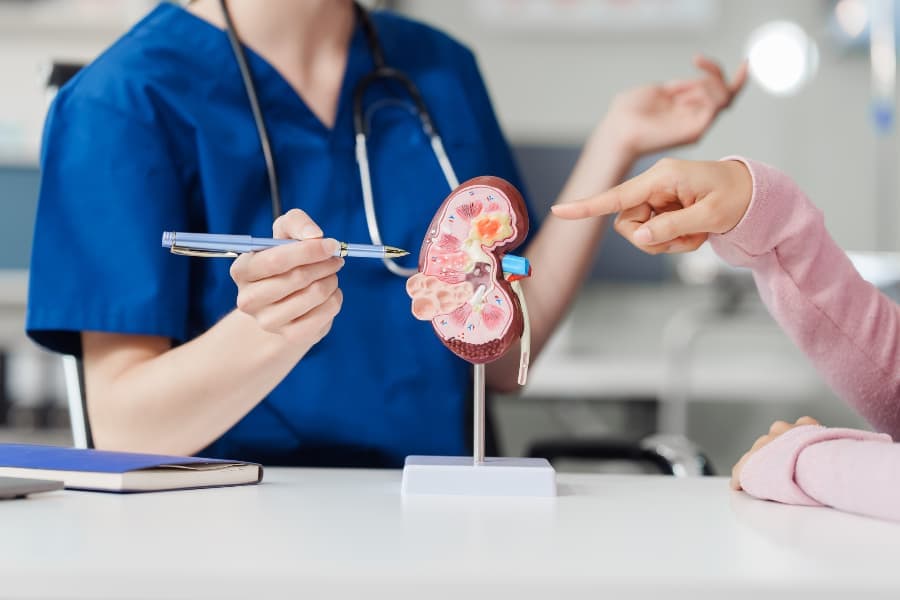The kidneys are among the most important organs in the body. They perform the vital role of filtering toxins, excess fluids, and other waste products from blood. When they stop working correctly, the resulting imbalance can create complications throughout the body. Maintaining healthy kidneys is, therefore, crucial to a person’s overall well-being. Here, Richmond University Medical Center discusses early signs of the disease and kidney disease prevention strategies that can reduce the risk of kidney failure.
What Do the Kidneys Do?
The body contains five to six liters of blood, or about one and a half gallons. It is responsible for keeping organs hydrated, delivering necessary nutrients, and removing waste products produced by bodily processes. All of these jobs are essential to keep the body functioning properly.
As blood circulates through the body, it makes a stop at the kidneys. These organs filter acid and other waste products out of the blood. They also remove excess water and minerals, including sodium, calcium, phosphorus, and potassium, to maintain a healthy balance. This balance is vital to keeping nerves, muscles, and tissues working normally. The waste products leave the body as urine, while the filtered blood returns to the bloodstream to continue doing its job.
What Is Kidney Disease?
Kidney disease occurs when the kidneys become damaged and cannot do their job properly. Without adequate filtration, the mineral balance in the blood begins to shift. Waste products accumulate without being removed, potentially interfering with kidney function. There are many potential causes for kidney disease, including:
- High blood sugar, often due to diabetes
- High or low blood pressure
- Chronic or severe dehydration
- Consumption of too much salt
- Excessive use of certain medications
- Urinary tract obstructions (kidney stones)
- Immune system disorders
Kidney disease is progressive, meaning that it worsens over time. In its early stages, it causes few symptoms and is relatively easy to manage. As it reaches late stages, however, intensive treatments such as hemodialysis are required to replace the kidney’s function. This is why proactive prevention is vital. While there is no cure for chronic kidney disease, the right lifestyle choices can slow or stop its progress to help patients stay healthier for longer.
Recognizing the Signs of Kidney Disease
One of the most important ways to avoid serious kidney disease is by understanding the signs. If a person notices something wrong, they can take steps to address the issue before it gets worse.
Urine is one of the best indicators of kidney function. Normal, healthy urine is clear or light yellow with a watery consistency. Dark, highly concentrated urine is a sign of dehydration, which may lead to kidney disease. Foamy or frothy urine is high in protein, indicating an imbalance, while brownish or pinkish urine may contain blood. Kidney disease can cause other symptoms as well, including:
- Blood in urine
- Poor appetite
- Swollen ankles, feet, or hands
- Shortness of breath
- Difficulty sleeping
- Itchy skin
If a person experiences any of these signs, they should speak with a nephrologist (kidney specialist). The sooner kidney disease is diagnosed and treated, the better for the patient’s long-term well-being.
Strategies for the Prevention of Kidney Disease
While all individuals should pay attention to signs of kidney disease, early stages do not always cause symptoms. This makes reactive treatment less reliable. Instead of waiting for symptoms to appear, Richmond University Medical Center recommends that people be proactive about keeping their kidneys healthy. The following lifestyle strategies promote good kidney health:
Staying Hydrated
Staying hydrated ensures that the blood and kidneys receive enough fluid to function. Most healthcare professionals recommend drinking 11 to 15 cups of water per day or six to eight large glasses. Fruits and vegetables can contribute to this total.
Eating a Healthy Diet
Eating a healthy diet can prevent high blood pressure and other issues that lead to kidney disease. People at risk of kidney disease are advised to reduce sugar and red meat, avoid highly processed foods, and maintain a healthy balance of nutrients.
Managing Blood Pressure and Diabetes
Patients diagnosed with diabetes or high blood pressure conditions are at a higher risk for kidney disease. Proper management of these diseases can mitigate this risk. Our endocrinology unit can help patients with effective diabetes management.
Preventing Kidney Stones
Kidney stones create urinary tract blockages, putting extra strain on the kidneys. People prone to kidney stones can prevent them by consuming more calcium and avoiding foods high in oxalate. These include spinach, potatoes, avocados, nuts, beans, coffee, and tea.
Promote Kidney Health with Richmond University Medical Center
There is no cure for kidney disease. However, by making healthy choices, people can reduce their risk. Richmond University Medical Center is committed to educating patients within our Staten Island, New York, community in order to promote good health. To learn more about kidney disease prevention and treatments, or to schedule an appointment with a nephrologist, contact us today.




